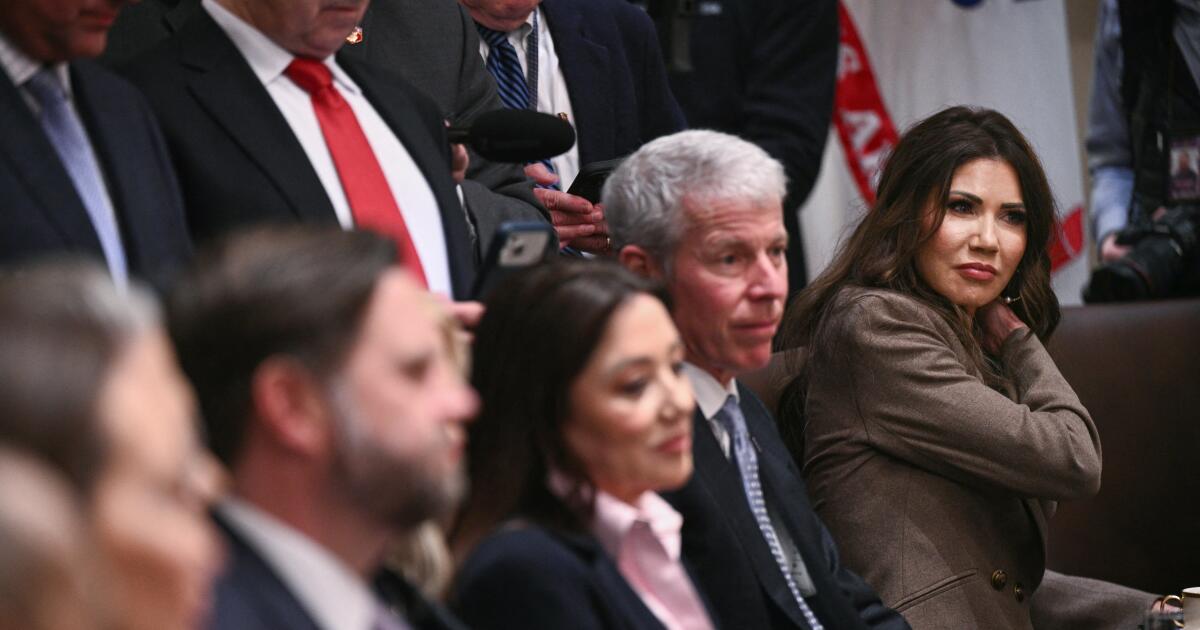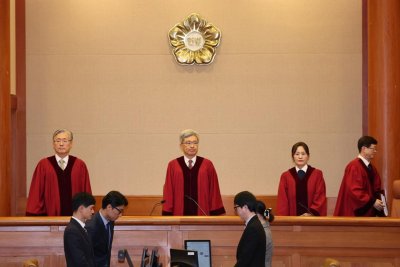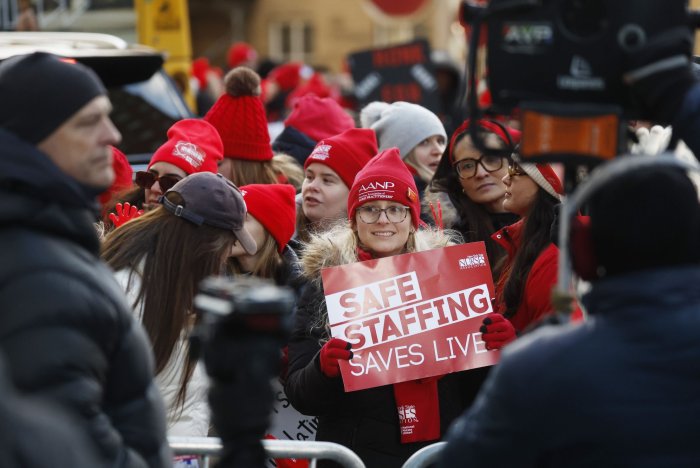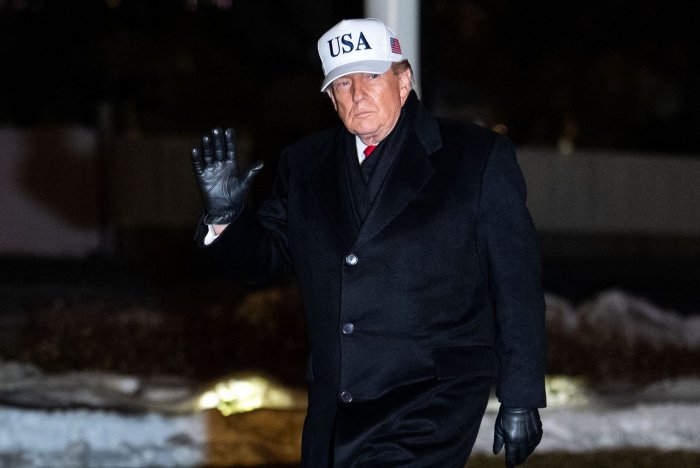Trump officials have tried to justify ICE shootings. Is it backfiring?
Just a few hours after Border Patrol agents shot and killed Alex Pretti in Minneapolis, the U.S. Department of Homeland Security issued a statement that said, without evidence, that the 37-year-old registered nurse “wanted to do maximum damage and massacre law enforcement.”
Homeland Security Secretary Kristi Noem would later imply Pretti had been “asked to show up and to continue to resist” by Minnesota’s governor.
Multiple videos from the scene immediately undercut those claims, and there has been no indication in the days since that Pretti threatened or planned to hurt law enforcement.
Several high-profile use-of-force incidents and arrests involving federal immigration agents have involved a similar cycle: Strident statements by Trump administration officials, soon contradicted by video footage or other evidence. Some law enforcement experts believe the repeated falsehoods are harming federal authorities both in the public eye and in the courtroom.
The top federal prosecutor in Los Angeles, Bill Essayli, has taken five defendants to trial on charges of assaulting officers — and his office has lost each case. Court records and a Times investigation show grand juries in Chicago, Washington, D.C., and Los Angeles have repeatedly rejected criminal filings from prosecutors in similar cases.
Despite the repeated judicial rebukes, administration officials have continued to push for criminal charges against people at protest scenes, including the controversial arrest of former CNN anchor Don Lemon on Friday.
“When top federal law enforcement leaders in the country push false narratives like this, it leads the public to question everything the government says going forward,” said Peter Carr, a former Justice Department spokesman in Washington who served in Democratic and Republican administrations. “You see that in how judges are reacting. You’re seeing that in how grand juries are reacting. You’re seeing that in how juries are reacting. That trust that has been built up over generations is gone.”
The credibility concerns played out in a downtown L.A. courtroom in September, when Border Patrol Cmdr. Greg Bovino served as the key witness in the assault trial of Brayan Ramos-Brito, who was accused of striking a Border Patrol agent during protests against immigration raids last summer. Video from the scene did not clearly capture the alleged attack, and Bovino was the only Border Patrol official who testified as an eyewitness.
Under questioning from federal public defender Cuauhtémoc Ortega, Bovino initially denied he had been disciplined by Border Patrol for calling undocumented immigrants “scum, filth and trash,” but later admitted he had received a reprimand. The jury came back with an acquittal after deliberating for about an hour. A juror who spoke to The Times outside court said Bovino’s testimony detailing his account of the alleged assault had “no impact” on their decision.
Last year, a Chicago judge ruled Bovino had “lied” in a deposition in a lawsuit over the way agents used force against protesters and journalists.
Spokespersons for Essayli and the Department of Homeland Security did not respond to requests for comment.
Essayli’s prosecutors have seen four additional cases involving allegations of assault on a federal officer end in acquittals, a nearly unheard of losing streak. A Pew study found fewer than 1% of federal criminal defendants were acquitted throughout the U.S. in 2022.
“The credibility of the prosecutor’s office and the credibility of the law enforcement officers testifying is key,” said Carley Palmer, a former federal prosecutor in L.A. who is now a partner at Halpern May Ybarra Gelberg. “That is especially true when the only witness to an event is a law enforcement officer.”
Jon Fleischman, a veteran Republican strategist and former spokesman for the Orange County Sheriff’s Department, said federal law enforcement officials have a responsibility to be the “mature, responsible player in the room” and remain as apolitical as possible. While he is a firm supporter of President Trump’s immigration agenda and said the Biden administration shares some blame for politicizing federal law enforcement, Noem’s handling of Pretti’s killing was problematic.
“What she said really doesn’t bear out in terms of what the facts that are available tell us,” Fleischman said. “I think it undermines the credibility of the justice system.”
Fleischman added that he feared some of the government’s recent missteps could dull approval of the platform that twice carried Trump to the White House.
“One of the main reasons I’ve been so enthusiastic about this president has been his stance on immigration issues,” he said. “When you see unforced errors by the home team that reduce public support for the president’s immigration agenda, it’s demoralizing.”
Another top Trump aide, White House Deputy Chief of Staff Stephen Miller, also spoke out after the Minnesota shooting, calling Pretti an “assassin.”
Responding to a Times reporter on X, Miller said recent legal defeats in Los Angeles were the result of “mass judge and jury nullification, deep in blue territory, of slam-dunk assault cases.”
Accounts from inside L.A. courtrooms paint a different picture.
Carol Williams, a jury foreperson in the most recent assault trial which federal prosecutors lost in L.A., said the people she served with steered clear of conversations about the news or ICE raids.
“We didn’t talk about the protests in L.A. and we didn’t talk about the protests that were in Minnesota or anything,” Williams said. “People, I’m sure, probably keep up with the news, but in terms of bringing that into the jury room, we did not.”
Last year, Essayli and Tricia McLaughlin, the chief Homeland Security spokesperson, accused Carlitos Ricardo Parias of ramming immigration agents with his vehicle in South L.A., causing an agent to open fire. Video made public after the assault charges were dismissed last year, however, do not show the vehicle moving when the ICE agent opens fire, injuring Parias and a deputy U.S. marshal.
After being presented with the body-camera footage, McLaughlin reiterated the claim that Parias weaponized his vehicle and said officers “followed their training and fired defensive shots.”
McLaughlin also labeled Keith Porter Jr. — a Los Angeles man shot and killed by an off-duty ICE agent in Northridge on New Year’s Eve — an “active shooter” in initial media comments about the case, using a term that typically refers to a gunman attempting to kill multiple people.
Los Angeles police said nobody else was injured at the scene and have not used the “active shooter” wording in statements about the case.
Porter’s family and advocates have argued that force was not warranted. They said Porter was firing a gun in the air to celebrate the new year, behavior that is illegal and discouraged as dangerous by public officials.
A lawyer for the agent, Brian Palacios, has said there is evidence Porter shot at the agent.
Carr, the former Justice Department spokesman, said the Trump administration has broken with years of cautious norms around press statements that were designed to protect the credibility of federal law enforcement.
“That trust is eroded when they rush to push narratives before any real investigations take place,” he said.
In one case, the refusal of Homeland Security officials to back down may cause video footage that further undercuts their narrative to become public.
Last October, Marimar Martinez was shot five times by a Border Patrol agent in Chicago who alleged she was following him in a car and interfering with an operation. In a statement, McLaughlin accused Martinez of ramming a law enforcement vehicle while armed with a “semiautomatic weapon.”
Federal prosecutors in Chicago dropped the charges, but McLaughlin and others continued to describe Martinez as a “domestic terrorist.” As a result, Martinez filed a motion to revoke a protective order that has kept hidden video of the incident and other evidence.
“While the United States voluntarily dismissed its formal prosecution of her with prejudice … government officials continue to prosecute Ms. Martinez’s character in the court of public opinion,” the motion read.









